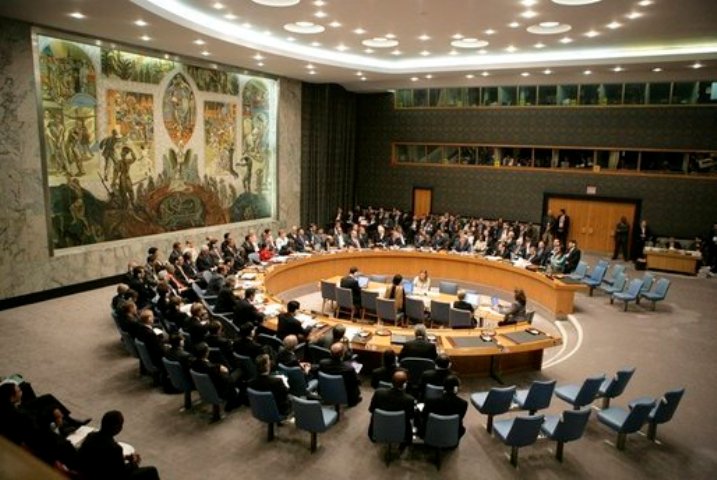Nigeria’s ambassador to UN Tijjani Muhammad-Bande elected as UNGA president

Nigeria’s Ambassador to the UN Tijjani Muhammad-Bande, elected as the next President of the General Assembly, said he will try and hasten the long-delayed reform process of the Security Council to ensure that the powerful UN organ is more democratic and efficient. The long-pending reform of the powerful 15-nation UN organ has made little progress after the Inter-Governmental Negotiations (IGN) a decade ago.
The negotiations process for UNSC reforms is headed for roll-over to the next UNGA session that starts in September without making much headway this year. India has been calling for the reform of the UN Security Council along with Brazil, Germany and Japan for long, emphasising that it rightly deserves a place at the UN high table as a permanent member.
Muhammad-Bande, who will succeed incumbent Maria Fernanda Espinosa, was elected by acclamation on Tuesday as President of the 74th session of the General Assembly, beginning in September. Congratulating Muhammad-Bande on his election, India's UN Ambassador Syed Akbaruddin tweeted, “A friend of India is elected as next Prez of @UN General Assembly. Congratulations from all of team @IndiaUNNewYork to Prof Tijjani Muhammad Bande of Nigeria on his election by acclamation."
Talking to reporters following his election, he said it is “untenable” to have no improvement in the reform process of the Security Council, which needs to be made more democratic and efficient. Last week, India had strongly criticized the co-chairs of the IGN on Security Council reform for following an “exclusionary approach,” saying it cannot “sanctify as normal” their “opaque methodologies” and “obfuscation of references” in moving the long-stalled reform process forward.
India's envoy to the UN Syed Akbaruddin had said that given by how the process has gone forward this year, India “cannot agree” that "Member States are driving the IGN process forward together in accordance with the usual practice and procedures of the General Assembly.” Muhammad Bande, a former University professor, noted that the IGN on UNSC reforms have not moved as fast as the Member States had wanted it to but it is clear that no delegation thinks it is fair to continue without a reform of the 15-nation Council.
“Negotiations are continuing and they will continue. We will try to hasten those negotiations in the spirit of fairness and in the spirit that an organization 73 years later cannot continue to talk the same language that was spoken 50-70 years ago,” he said. He said while there are support and consensus for Africa to have permanent representation in the Council, the reform process and the Council is not only for one group.
“It is a consensus element involving the Member States. Progress is being made, we will continue to push this and at some point, we will get to the point where the Security Council will be more democratic and more efficient,” he said. The Nigerian diplomat said that his delegation will study the draft IGN report from the current session and “see how we can narrow difference” so that "within a few years, we can see light at the end of the tunnel.”
He asserted that it is important to see improvement over the current situation, which is “untenable.” “We have to have the reform, it is a democratic process. We have to continue and not lose sight of the goal, which is to have fair, just and quick reform of the Security Council,” he said.
Earlier, addressing the 193-member General Assembly after his election, Muhammad-Bande had said that implementation of existing mandates and the 2030 Agenda with particular focus on peace and security, poverty eradication, zero hunger, quality education, climate action and inclusion will constitute the major properties of his presidency. “I am committed to promoting partnerships that are needed from all stakeholders to achieve our objectives and ultimately ensure that we do our best to ensure peace and prosperity, particularly for the most vulnerable,” he said.
Muhammad-Bande said that nations must continue to invest in sustaining peace and conflict prevention given the organisation's goal to “save succeeding generations from the scourge of war.” He said that the promotion of human rights and the empowerment of women and youth deserve special attention and he will be devoted to the promotion of gender parity throughout the whole UN system, starting from his own office.
The 74th session of the General Assembly will see several high-level meetings including the High-level Political Forum, the Secretary-General's Climate Summit, the high-level events on Universal Health Coverage, Financing for Development and the commemoration of Beijing+25, providing “major opportunities to promote the implementation of our goals and targets.”
The Nigerian diplomat said, “we must seize each of those opportunities to galvanize political momentum and action at the highest level. I am committed to promoting partnerships that are needed from all stakeholders to achieve our objectives, and ultimately ensure that we do our best to ensure peace and prosperity, particularly, for the most vulnerable.”
India had supported Muhammad-Bande’s candidature describing him as a “great friend” and a “well-known son of Africa” during an informal interactive dialogue with the Nigerian envoy last month.
(With inputs from agencies.)
ALSO READ
Brazil judge opens inquiry into Musk for obstruction involving social media company X
Brazil's Lula calls meeting on the future of Petrobras CEO, sources say
Brazil judge opens inquiry into Musk for obstruction involving social media company X
UPDATE 1-Brazil judge opens inquiry to Musk after refusal to block accounts on X
Brazil Supreme Court justice investigating Elon Musk over fake news and alleged obstruction










